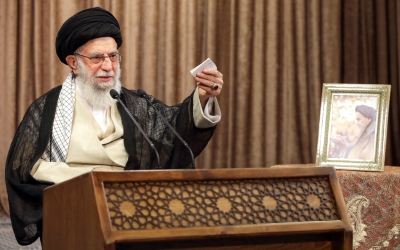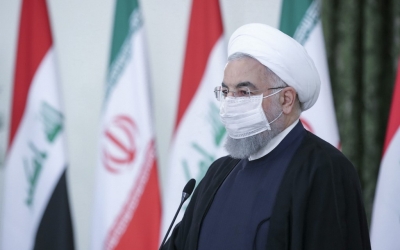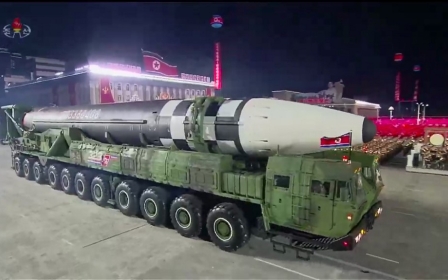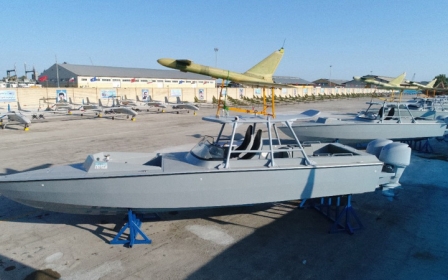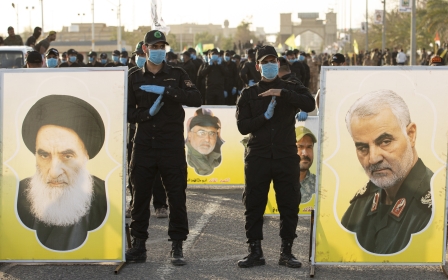Iranian press review: Lifting of UN arms embargo celebrated by reformists
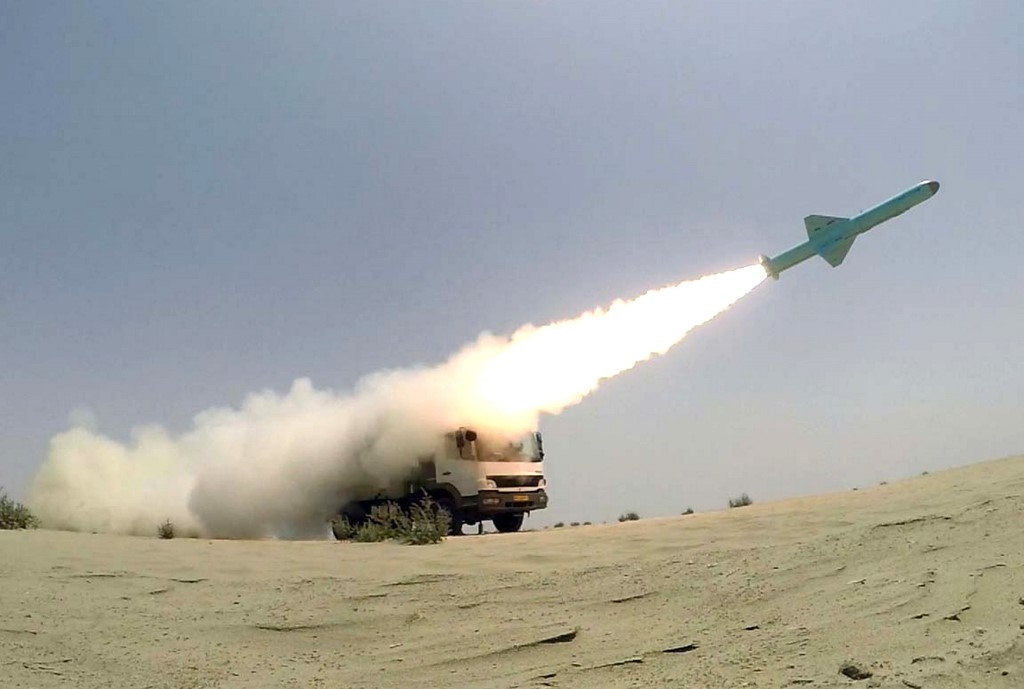
Political factions divided over end of arms embargo
The termination of a 13-year UN arms embargo on Iran, which ended on Sunday in line with the five-year timetable set out in the 2015 Iran nuclear deal, has been celebrated by the moderate and reformist politicians who support President Hassan Rouhani.
Iran’s foreign and defence ministers, as well as Tehran’s ambassador to the UN, hailed the end of the embargo, saying Iran could now legally buy the weapons it needed, as well as exporting its armaments to other countries.
The pro-reformist Etemad daily said the lifting of the embargo was a diplomatic victory over Washington.
Since the 2018 unilateral withdrawal of the United States from Iran’s nuclear accord, President Donald Trump’s administration has applied a maximum pressure strategy against Tehran.
New MEE newsletter: Jerusalem Dispatch
Sign up to get the latest insights and analysis on Israel-Palestine, alongside Turkey Unpacked and other MEE newsletters
“The least that Iran has gained with the policy of ‘strategic patience’ is the gap that has been created between the policies of Europe and Donald Trump’s America,” Etemad wrote.
Many conservatives who opposed the 2015 agreement remained silent about the lifting of the embargo. But some accused Rouhani’s administration of inking a bad deal in 2015, which had extended the UN arms embargo until 2020.
“Russian Foreign Ministry Spokeswoman Maria Zakharova recently said that Iran’s nuclear negotiating team in 2015 voluntarily accepted to extend a terminated UN arms embargo,” the conservative Kayhan daily wrote.
“Considering this fact, it is surprising to see how Rouhani’s administration and reformist media have celebrated the end of the embargo as a great achievement of the nuclear deal.”
Moreover, Iranian analysts said that the end of the UN embargo would not alter Tehran’s options regarding arms purchasing due to its economic crisis and the reluctance of its two strategic allies, Moscow and Beijing, to sell weapons to Tehran.
Saber Gol Anbari, an international political analyst, in an opinion piece for Iran Diplomacy, stressed that even with the embargo lifted, no country would sell arms to Iran to avoid punishments by Washington.
“Even if Russia really wants to sell arms to Iran, its strategic relations with Israel would not make it possible,” he added.
Abdolreza Faraji Raad, Iran’s former ambassador to Norway, told the Arman daily that during the embargo “Iran has produced most weapons that it required” and “in different ways secured receiving the rest of the weaponry it needed”.
“At this time, Iran is not seeking a giant deal to import arms, nor is it looking for exporting weapons to other countries,” Faraji Raad was quoted as saying.
Rouhani under fire over talk of peace
President Hassan Rouhani’s attempts to broker peace with the country’s enemies have been attacked by hardliners, who suggest no talks should take place with Washington while Iran is under the US’s full embargo.
In a cabinet meeting last week, Rouhani had said: “We should be men of war at the time of war, and men of peace at the time of peace.”
Despite Rouhani not mentioning anything about holding talks with the US, conservative legislators have accused him of scheduling negotiations with Washington - and urged that he be impeached.
Mohammad Hosseini, a cabinet minister under former president Mahmoud Ahmadinejad, accused Rouhani of the “distortion of history to justify his surrender to enemies”, the Mardom Salari daily reported.
On 17 October, in a video posted on Twitter, Iranian hardline legislator Mojtaba Zolnouri urged lawmakers to sign a request for the president’s impeachment “to solve the country’s problems”, saying 33 lawmakers had already signed the letter.
On Sunday, Alef website wrote that 27 more lawmakers had signed the impeachment letter. To begin the process of impeachment in Iran’s parliament, at least 72 lawmakers must sign the letter.
After a week of rift between lawmakers and Rouhani’s administration, the impeachment process was halted on Tuesday, the Ebtekar daily reported.
Meanwhile, reformist analysts believe the recent attacks on Rouhani are part of a propaganda campaign by the conservatives, working together towards Iran’s 2021 presidential elections.
“The hardliners’ think-tanks have noticed that for success in the upcoming presidential elections, they need to expand their strategy of throwing dirt [at rival parties],” wrote the Iran daily.
Since May, following the hardliners’ landslide victory in the legislative elections, Iranian moderate and reformist politicians have been under pressure to take a more aggressive stance against the US.
Young boy’s suicide shocks Iran
The death by suicide of an 11-year-old student in the southern port city of Dayyer has shocked and angered Iranians.
Last week, local media reported that Mohammad Mousavizadeh died because his poor family could not afford to buy him a smartphone to attend virtual classes during the coronavirus pandemic.
Iran is the country hardest hit in the region by the virus. Since the beginning of its spread in March, Iranian students have been encouraged to study online.
'Poverty and hopelessness, along with the inaction of officials, are the main causes of suicide in the country'
- Aman-allah Gharaei Moghadam, Iranian sociologist
Provincial officials have rejected the idea that Mousavizadeh took his own life for not having access to the necessary learning technology.
But his parents confirmed that he could not attend virtual classes because the family’s only smartphone was broken.
“He had been doing his homework with the phone that I bought him, but then the phone had broken a while ago,” Mousavizadeh’s father told the Shahrvand daily.
“He could not do his homework anymore and asked me to buy a new phone. I promised to buy him one as soon as I could.”
Mousavizadeh’s father is a pensioner, and his mother, the family’s breadwinner, is a domestic worker.
Since the reopening of schools in September, experts have warned that nearly a quarter of the 15 million students in Iran lacked the basic equipment to attend virtual classes.
In recent months, Iranian sociologists have raised the alarm about the increasing suicide rate among young people due to the economic crisis caused by US sanctions, corruption and coronavirus.
Aman-allah Gharaei Moghadam, an Iranian sociologist, in an editorial for the Aftab daily, warned that Iran’s current economic crisis could cause more hopelessness among young people and result in the “total collapse of the middle class” in the country.
“Poverty and hopelessness, along with the inaction of officials, are the main causes of suicide in the country,” he wrote.
*The Iranian press review is a digest of reports that are not independently verified as accurate by Middle East Eye
Middle East Eye delivers independent and unrivalled coverage and analysis of the Middle East, North Africa and beyond. To learn more about republishing this content and the associated fees, please fill out this form. More about MEE can be found here.


